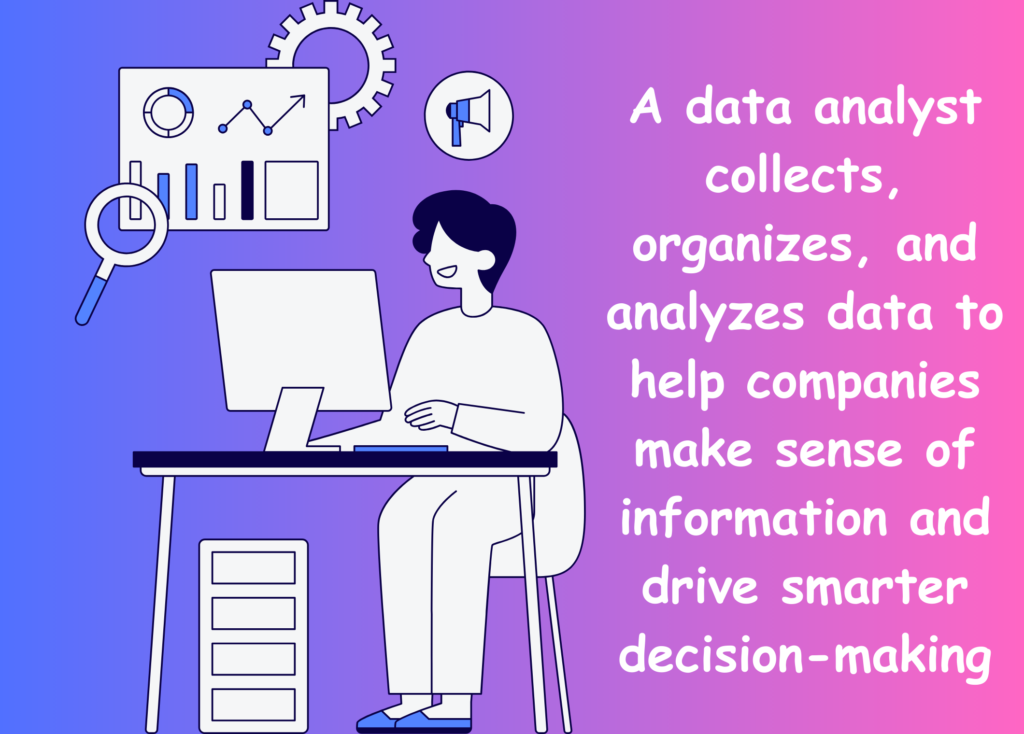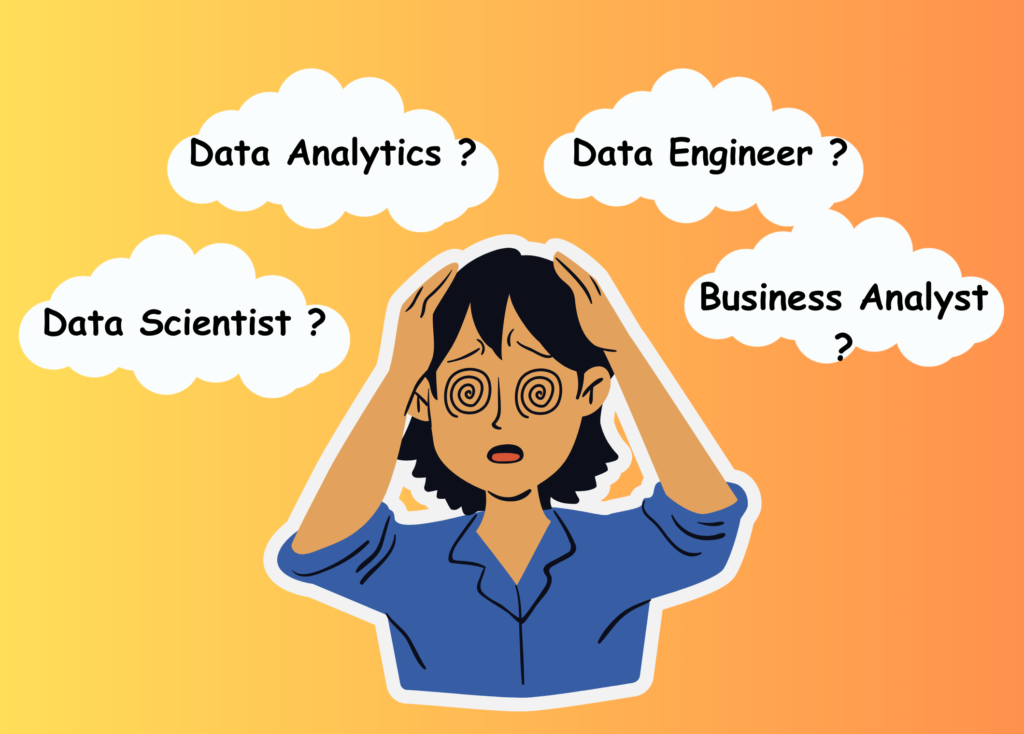Table of Contents
Introduction
Many students might be asking themselves today: How to become a data analyst in India even if you don’t have a relevant degree? Well, I’m here to provide the answer. Let’s begin with an introduction, and I’ll guide you step by step through the process until the end.
In today’s digital era, the demand for skilled data analysts in India is skyrocketing, offering fantastic career prospects for those who love working with numbers and analytics. If you’re interested in pursuing a career in data analysis in India, you’ve landed in the perfect spot. In this blog, we’ll delve into the steps, strategies, and resources necessary for embarking on a successful journey toward becoming a data analyst in India.
You may have encountered numerous articles outlining the qualifications needed a degree in statistics, mathematics, computer science, economics, or engineering to become a data analyst. However, what if you don’t come from those specific backgrounds? What should you do then? Well, worry not, because to become a data analyst, you don’t necessarily need a degree in statistics, mathematics, computer science, economics, or engineering. While having one of these backgrounds can certainly give you a leg up and an advantage when diving into data science, it’s not an absolute requirement.
The truth is, what truly matters is having the essential knowledge and skills to excel as a data analyst. And what exactly are these knowledge and skills? That’s precisely what we’re here to explore. So, let’s dive in and uncover the key skills and knowledge you need to kickstart your journey into the world of data analysis.
Things you should know before starting your journey to become data analyst
Before you embark on your journey to become a data analyst, there are a few key things you should know. First and foremost, it’s essential to have a solid understanding of data science. You’ll encounter terms like data science, data engineer, business analyst, and data scientist quite often. It’s natural to feel a bit confused by these terms, but fear not! Before diving headfirst into this field, it’s crucial to lay down a strong foundation of knowledge.

Think of it like building a house – you wouldn’t start constructing walls without a sturdy foundation, would you? Similarly, you shouldn’t start your journey into data analysis without first understanding the basics. But don’t worry, I’m here to guide you through it all. Whether you’re puzzled by the difference between a data engineer and a data scientist or unsure about the role of a business analyst, I’ve got you covered.
So, grab a comfy seat and set aside some time. We’re about to embark on an exciting adventure into the world of data analysis. Get ready to expand your knowledge and clear up any lingering doubts. Are you ready? Let’s dive in!
Who is a Data Analyst ?
Have you ever wondered who a data analyst is? Well, a data analyst is someone who gathers, cleans, and understands data to help answer questions or solve problems. They’re like detectives, but instead of solving crimes, they unravel mysteries hidden within numbers and information.
Data analysts are found in various fields, from businesses to finance, criminal justice to science, medicine, and government. They play a crucial role in making sense of all the data floating around. Imagine you’re running a business and want to know which customers to target in your next advertisement campaign. Or perhaps you’re a doctor trying to figure out which age group is most at risk for a particular disease. Maybe you’re in finance and need to uncover patterns in behavior that could indicate financial fraud.
These are the kinds of questions that data analysts tackle every day. They dive into the sea of data, clean it up, and then use their skills to find patterns and insights that can help make better decisions.
So, next time you hear about a data analyst, remember they’re the ones who make sense of all the numbers and help solve real-world problems.

Understanding the Role of a Data Analyst
Before jumping into the specifics of becoming a data analyst in India, it’s crucial to grasp the role and responsibilities that come with this profession. A data analyst holds the vital task of gathering, processing, and analyzing large sets of data to uncover valuable insights that steer informed business decisions. Whether it involves recognizing market trends, streamlining operational processes, or predicting customer behavior, data analysts serve as linchpins across various industries throughout India.
Data Analysts: Shaping the Future
In today’s digital age, where data reigns supreme, the role of data analysts is more significant than ever. Virtually every company, big or small, is amassing data on their customers, recognizing the paramount importance of deciphering this wealth of information accurately.
Data analysts serve as architects of a company’s present state, meticulously scrutinizing data to discern shifts, detect patterns, and highlight irregularities that offer insights into organizational performance. Their keen eye for data nuances enables businesses to adapt, evolve, and thrive in an ever-changing landscape.
In essence, data analysts wield immense influence in shaping the trajectory of businesses, thereby playing a pivotal role in driving innovation and progress across industries.
Are you confused with these terms ?

Let's get familiar with it
Data Analytics
Data analytics is the overarching field that encompasses the roles of data analysts, data engineers, data scientists, and business analysts. It involves the process of collecting, organizing, analyzing, and interpreting data to inform decision-making and drive business outcomes. Whether it’s descriptive analytics to understand what happened, diagnostic analytics to understand why it happened, predictive analytics to forecast what might happen, or prescriptive analytics to suggest actions, data analytics covers a wide spectrum of activities aimed at deriving value from data.
Data Engineer
Data engineers are the architects behind the scenes. They design and build the infrastructure needed to collect, store, and process large volumes of data efficiently. Think of them as the builders of the data highway, ensuring smooth traffic flow for data analysts and scientists to work their magic.
Data Scientist
Data scientists are the wizards of the data realm. They possess a blend of skills in statistics, programming, and domain expertise to extract deep insights from complex datasets. They use advanced techniques like machine learning and predictive modeling to uncover patterns, trends, and correlations that help businesses make strategic decisions.
Business Analyst
Business analysts bridge the gap between data and business strategy. They analyze data to understand business processes, identify areas for improvement, and recommend solutions to enhance efficiency and profitability. Their role often involves translating technical insights into actionable strategies for business stakeholders.
Educational Pathways
For those aspiring to become data analysts in India, establishing a solid educational foundation is paramount. While obtaining a bachelor’s degree in fields such as statistics, mathematics, computer science, economics, or engineering serves as a sturdy launching pad, delving into advanced degrees such as a master’s or post-graduate diploma in data analytics can significantly augment one’s knowledge and proficiency in the domain. Numerous universities and institutes throughout India offer specialized programs in data analytics, equipping students with hands-on experience and a curriculum tailored to meet the demands of the industry.
How to become a data analyst in India even without a relevant degree.

If you find yourself passionate about pursuing a career as a data analyst but don’t come from a background in statistics, mathematics, computer science, economics, or engineering, fret not! There are still pathways available to enter the field. Many aspiring data analysts opt for alternative routes such as online courses, bootcamps, or self-study programs to acquire the necessary skills and knowledge. Platforms like Coursera, Udemy, and DataCamp offer a plethora of courses covering topics ranging from data analysis fundamentals to advanced techniques in data science. Additionally, networking with professionals in the field, seeking mentorship, and engaging in practical projects can also help bridge the gap and pave the way for a successful career transition into data analytics. Remember, determination, perseverance, and a willingness to learn are key ingredients for success, regardless of your background
Essential SKILLS needed to become a data analyst, along with FREE learning resources to kickstart your journey
Programming Proficiency
Statistics
Imagine you’re a detective deciphering clues from a crime scene—that’s how important statistical analysis is. Understanding concepts like hypothesis testing, regression analysis, and data modeling is like having a magnifying glass to scrutinize data intricately and unearth hidden truths.
Data Visualization
Ever heard the saying “A picture is worth a thousand words”? Well, in the world of data analysis, that couldn’t be truer. Being able to whip up captivating visualizations using tools like Tableau, Power BI, or matplotlib is crucial for presenting your findings in a way that’s easy to understand for everyone, from your teammates to top executives.
SQL
Mastering SQL is like gaining access to a powerful toolkit for handling data with finesse. Just as a wizard wields their wand to unlock magical powers, SQL empowers you to manipulate and analyze data effortlessly. Whether you’re extracting insights, performing statistical analysis, or delving into machine learning, SQL serves as your go-to tool. It’s like being a detective at a crime scene, where each query acts as a magnifying glass, revealing hidden truths within the data.
Domain Knowledge Mastery
Picture yourself as an expert in different realms like finance, healthcare, marketing, or e-commerce. By delving deep into these industries, you gain a superpower—the ability to analyze relevant data sets with precision and offer actionable recommendations. Stay updated on industry trends and best practices to keep your analysis sharp and impactful.
Here are some FREE books I am going to share with you
Practical Experience
While it’s crucial to grasp theoretical knowledge, nothing beats the value of practical experience for budding data analysts in India. Getting your hands dirty with real-world projects and internships offers priceless insights. So, how can you dive into this realm and sharpen your analytical prowess? Here’s a guide tailored just for you.
-
Dive into Real-World Projects: Instead of solely relying on textbooks, immerse yourself in practical endeavors. Work on projects that involve real data sets and tackle genuine challenges faced by industries. This hands-on approach not only hones your skills but also gives you a taste of what awaits in the professional world.
-
Embrace Internships: Internships are like gold mines for budding data analysts. They provide a platform to apply your theoretical knowledge in real-time scenarios, under the mentorship of seasoned professionals. Seek out internships that offer exposure to diverse projects and tools, enabling you to broaden your skill set.
-
Participate in Hackathons and Competitions: Hackathons and competitions are exciting avenues to put your skills to the test. Collaborate with peers, brainstorm solutions, and implement data-driven strategies to tackle challenges. These events not only foster creativity but also help you build a network within the industry.
- Contribute to Open-Source Projects: Open-source projects offer a collaborative environment where you can contribute and learn simultaneously. Dive into platforms like GitHub, where you can access a plethora of projects spanning various domains. By actively participating in such initiatives, you not only enhance your skills but also make meaningful contributions to the community.
Let's explore some valuable platform to kick start your journey
1. DataCamp Workspace
DataCamp provides an online integrated development environment (IDE) equipped with diverse datasets. Here, you can practice coding, analyze data, and refine your skills—all within a supportive learning environment.
2. Kaggle
Kaggle stands as a beacon for data enthusiasts, offering a vast repository of free datasets covering a wide array of topics. From finance to healthcare, you’ll find datasets for every niche, allowing you to explore and analyze real-world data with ease.
3. UCI Machine Learning Repository
This repository hosts a treasure trove of open-source datasets meticulously curated for machine learning tasks. The datasets here are renowned for their cleanliness, structure, and documentation, making them ideal for honing your analytical skills.
4. FiveThirtyEight
Dive into the world of interactive data-driven articles on FiveThirtyEight. Explore a plethora of mainstream topics backed by insightful datasets. By delving into these articles and datasets, you’ll gain a deeper understanding of data analysis techniques and their real-world applications.
5. Google Dataset Search
Harness the power of Google’s extensive dataset repository through Google Dataset Search. With over 25 million free public datasets at your fingertips, you can explore various domains and discover datasets tailored to your interests.

1. Data Cleaning Projects
Begin by demonstrating your capability to organize and refine raw data for analysis. This could involve tasks like removing duplicates, handling missing values, and ensuring data consistency.
2. Exploratory Data Analysis (EDA) Projects
Show your proficiency in summarizing and visually representing data to derive meaningful insights. This might include generating summary statistics, creating visualizations like charts or graphs, and identifying patterns or trends within the data.
3. Statistical Analysis or Machine Learning Projects
Highlight your expertise in extracting valuable insights or making predictions from data using statistical methods or machine learning algorithms. You can showcase projects where you’ve applied regression analysis, classification techniques, or clustering algorithms to solve real-world problems.
4. Business Analysis Projects
Demonstrate your understanding of how data-driven decisions impact business outcomes and metrics. This could involve analyzing sales trends, identifying cost-saving opportunities, or optimizing marketing strategies based on data analysis.
5. Soft Skills
Include any presentations or reports you’ve prepared to demonstrate your ability to communicate complex findings effectively. This showcases your proficiency in conveying technical information to non-technical stakeholders, an essential skill for any data analyst.
Once you feel confident in your skills, consider focusing on projects related to a specific industry or domain of interest. This allows you to deepen your understanding of relevant concepts and challenges within that field while showcasing your expertise through tailored projects.
You can showcase your portfolio on platforms like DataCamp Workspace, GitHub, or Kaggle, which offer free hosting for data analysis projects. These platforms provide excellent visibility for your work and are ideal for entry-level data specialists. Additionally, consider creating a personal website to further highlight your projects and expertise to potential employers or clients.
Applying for Entry-Level Jobs

As you continue on your path to becoming a data analyst in India, it’s essential to keep an eye out for job openings and internship opportunities in well-known companies across different industries. Starting with entry-level positions is a great way to kickstart your career journey. These positions provide valuable experience and allow you to build a strong foundation in the field.
As you gain experience in your role, it’s important to keep learning and growing. Consider pursuing certifications, advanced courses, or specialized training programs to further develop your skills and stay competitive in the job market. These additional qualifications can enhance your resume and increase your chances of landing more advanced roles in the future.
Furthermore, staying updated with the latest technologies and industry trends is crucial for long-term career success. Be proactive in exploring new tools and techniques used in data analysis, and adapt to changes in the industry as they occur. This continuous learning and adaptation will not only help you excel in your current role but also pave the way for future career growth as a data analyst in India.
Conclusion
In India, becoming a data analyst is an exciting and fulfilling career choice for those who love working with data and analytics. By following the steps outlined in this guide and making use of the wealth of resources available, you can start on a path that leads to success as a skilled and in-demand data analyst in India. It’s important to stay curious, continue learning, and be open to opportunities for growth and innovation in the ever-evolving field of data analytics. Your future as a data analyst in India is full of possibilities – go after it with determination and enthusiasm.


